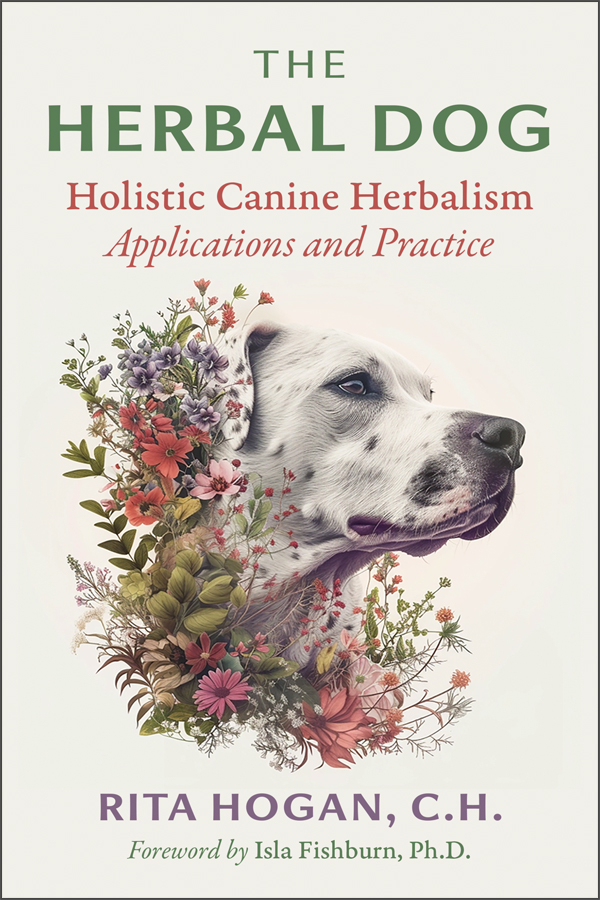- Home
- Editor's Notes
- Current Issue
- Riki Reflects
- Spiritual Traveler
- Starz Emporium
- Classifieds
- Advertise with Us
- Submissions
- Awards
- About Us
- Contact Us
The Herbal Dob
By Rita Hogan
 Herbal Dog
Allergies and Sensitivities True allergies produce anaphylaxis. If this is the case for your dog, work with your vet and contact a homeopathic veterinarian to work out a plan for long-term care and healing. Most “allergies” are sensitivities. As veterinarian Peter Dobias observes, “If we consider that almost 80 percent of immune system function resides in the gut, there’s no surprise that heavily processed foods, poor quality ingredients, drugs and vaccines, toxic stances, and food preservatives can get the immune system into overdrive and make it overreact.” Many sensitivities are triggered by the presence of undigested proteins in the small intestines, which cause inflammation and can lead to a leaky gut, where the gut lining thins, becomes permeable, and allows “leaks” into the bloodstream. This causes extreme sensitivity to normal foods. Many sensitivities arise from insufficient stomach acid. Strong stomach acids are integral for the breakdown of proteins into amino acids. When proteins don’t get broken down properly, they’re marked for termination by the immune system and then the liver. Overloading the immune sys- tem leads to many issues, including acid reflux, depleted microflora, food sensitivities, hot spots, itchiness, poor assimilation and elimination, liver congestion, yeast overgrowth, and leaky gut. If it’s not dealt with, you can end up with a dog who can’t eat any proteins without reacting. Stomach Acid and Digestive Enzyme Antagonists
Acid reducers Antacids Antibiotics Antihistamines Bromide Chlorine Dewormers Dryness Flea and tick medicines Fluoride Liver and LymphaticsIt’s important to support the liver and lymphatic system for dogs with allergies/sensitivities because congestion in either system can have a negative impact on both the immune system and the digestive system. A slow-down in liver function will back up the portal vein and cause a cascade of excessive histamine and blood toxins as well as difficulties with nutrient assimilation and waste elimination. Lymphatic congestion can make overall congestion worse. Stimulating lymph circulation helps improve all organ functions as well as cellular nutrition.Seasonal Allergies
Many dogs who suffer from allergies throughout the spring and summer deal with the release of histamine. Upon contact with an allergen, mast cells release histamine and cause the typical allergic reactions like backward sneezing and itchiness. (These reactions happen continually, rather than seasonally, when a dog has a mast cell tumor.) Remember, histamine is a normal part of how the body works. Histamine Histamine isn’t an enemy. It’s essential for bodily functions like appetite regulation and brain, immune, muscle, and nerve function. It’s also intricately linked with digestion and stomach acid levels. Allergic-type reactions are often treated with over-the-counter antihistamines, but these medications can themselves cause allergies and sensitivities. Their side effects include nausea, diarrhea, dizziness, weakness, loss of appetite, stomach pain, rapid heart rate, hives, and painful urination. In contrast, natural antihistamines help repair and work with your dog’s natural histamine cycle. You can add herbal antihistamines to your dog’s protocol, or try supplementing with quercetin, which naturally helps regulate histamine. Natural antihistamines: chaga mushroom, cordyceps mushroom, ginger, green tea (decaffeinated), maritime pine bark, nettle, reishi mushroom, spirulina, turmeric Natural sources of quercetin: apples, black currents, blueberries, broccoli, kale, rose hips Tip! For a powerful antihistamine combination, mix equal parts of nettle, maritime pine bark, and chaga mushroom powder. Give 1/8 teaspoon for every 10 pounds of your dog’s weight, twice daily in food. If you think your dog has issues with histamine, avoid bone broth, fermented foods, and any leftover foods, which are all high in histamine. You can work these back into your dog’s diet when their symptoms have calmed down and you’ve done work to support their liver. Digestive Enzyme Supplements Digestive enzymes can help dogs with food sensitivities and allergies by helping them thoroughly break down proteins and in turn avoid a triggered immune response from partially broken-down proteins. When looking at supplementing digestive enzymes in your dog’s diet, it may take some trial and error to find the right one. Options include pancreatic enzymes (amylase, protease, and lipase), papain, and betaine HCL. Once you find one that works well for your dog, continue to supplement it until any sensitivities are clear. Continue giving enzymes if you feed your dog kibble or cooked food. Tip! In my experience, warm dogs should avoid enzymes with bromelain. Extra-sensitive dogs need slow, gentle support for building tolerance and may do best with homeopathic-based enzymes. Protocol: Basic Elimination Diet The goal of this elimination diet is to bring down inflammation, increase stomach acid, and support liver function, assimilation, and elimination. I’ve seen this protocol work miracles. While you have your dog on this diet, be patient. If you feel bad about having to put your dog on this diet, don’t vocalize that. For example, “Oh, poor Fluffy can’t have his favorite carrots because he is on a special diet. I feel so bad for him.” Don’t do this to yourself or your dog. Vibration is everything. Be confident, and let your dog know they will feel better soon.
Helpful Herbs, Foods, and Supplements Herbs for warm dogs: burdock root, chamomile, cleavers, dandelion, echinacea, eyebright, marshmallow root, rose hips, skullcap, slippery elm, yarrow, yellow dock Herbs for cool dogs: astragalus, calendula, ginger, green tea (decaffeinated), licorice root, nettle, rosemary, slippery elm, turmeric Mushrooms: cordyceps, lion’s mane, reishi, turkey tail Phytoembryonic: black currant, horsetail, mountain pine Essential oils for self-selection: eucalyptus, German chamomile, helichrysum, lavender, peppermint, ravensara, sandalwood Homeopathic remedies: Arsenicum album, Euphrasia officinalis, Histaminum, Natrum muriaticum, Rhus toxicodendron, Staphysagria, Sulphur Supplements: chlorella, colostrum, digestive enzymes, N-acetylcysteine (NAC), phytoplankton, prebiotics, probiotics, propolis, quercetin, spirulina, vitamin C Foods: apple, blueberries, broccoli, eggs, kale, kelp, leafy greens, moringa, organ meats, raw cow milk, raw goat milk. About the Author: Rita Hogan, C.H., is a clinical canine herbalist with more than twenty years of experience specializing in holistic canine herbalism. An educator, speaker, writer, and herbal medicine maker, she lives and practices in Olympia, Washington. https://www.canineherbalist.com |
Share this article with friends!
|
Copyright © 1998 - 2026 Mystic Living Today All rights, including copyright, in the content of these Mystic Living Today web pages are owned or controlled for these purposes by Planet Starz, Inc. Terms of Service Disclaimer and Legal Information For questions or comment, contact Starzcast@mysticlivingtoday.com. Reproduction of this page in any form is not allowed without permission of the author and the owner of this site. All material on this web site, including text, photographs, graphics, code and/or software, are protected by international copyright and trademark laws. Unauthorized use is not permitted. You may not modify, copy, reproduce, republish, upload, post, transmit or distribute, in any manner, the material on this web site. Unless permissions is granted. |



